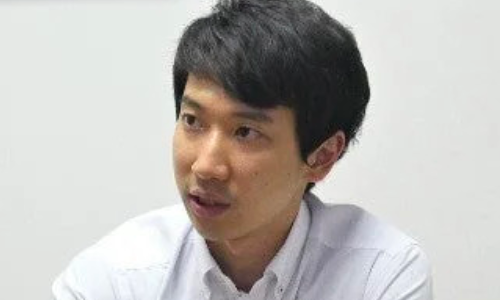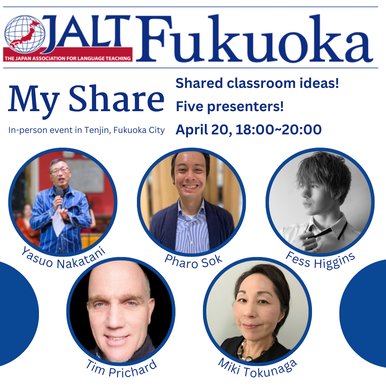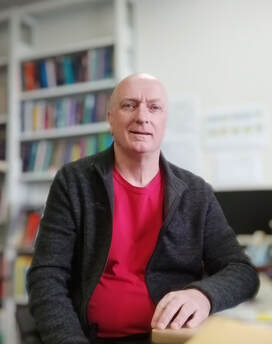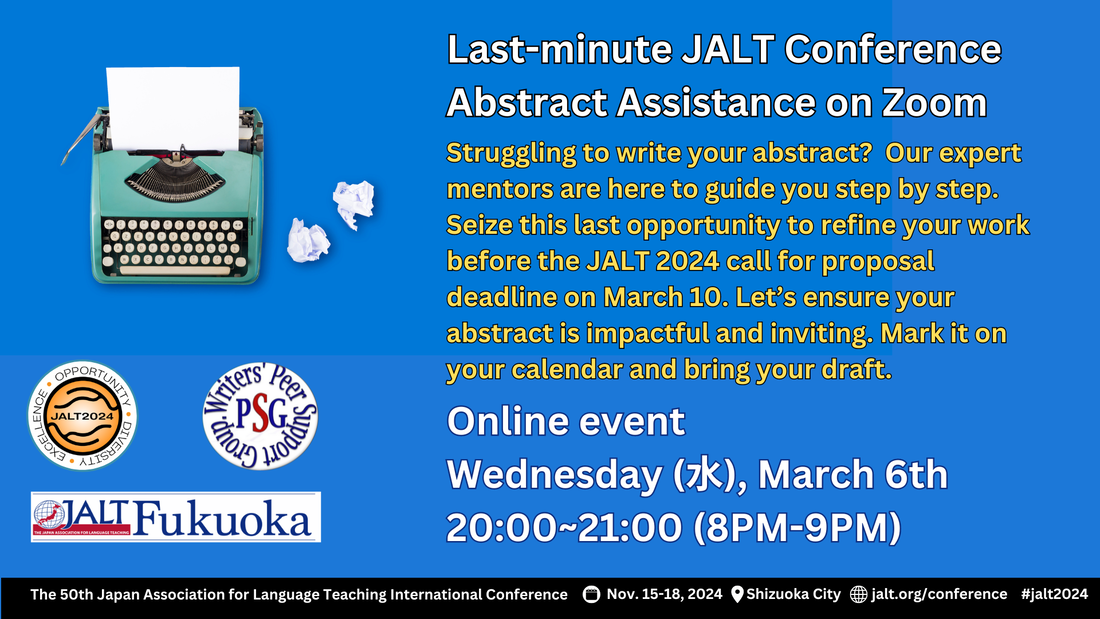Archive of past 2024 events in Fukuoka JALT
For upcoming events, please see our front page.
Self-Talk: An Investigation into Students' Self-Talk during Speech Assignments
Dawn Kobayashi (Onomichi City University)
Saturday, June 15, 2024 (2024年6月15日(土))
In-person event
6 PM (18:00)~8 PM (20:00)

Are you looking for ways to improve students' performance during speaking assignments? Self-talk (or internal dialogue) can mediate students' emotions and performance during tasks (Tod et al., 2011). Consequently, it offers us insights into students' experiences during high stress situations such as speech assessments. In this presentation, I will first introduce a teacher-research project conducted with 130 Japanese 1st-year university students. I asked students to retrospectively record examples of their self-talk before, during, and after a speech test. The results pinpoint the most stressful part of making a speech and identify types of self-talk that might be hindering or strengthening students. Finally, I will share how these findings will inform a future intervention study on effects of positive self-talk on performance. I hope you will join me to explore our experiences and ideas about enhancing student performance during speaking assignments and conducting teacher research.
Dawn Kobayashi is an associate professor of English at Onomichi City University Japan. She has taught English in Japan for over 20 years and earned her doctorate in education from the University of Liverpool. Her research interests are educational psychology especially self-efficacy, speaking fluency, and English through drama.
Location: Elgala (Daimaru East) Building, Tenjin (6 F, Kurume University Satellite Campus room; go in the back entrance shown on the map). From Hakata, take the Nanakuma Subway Line to Tenjin-Minami Station, exit 4. If you haven't been to this location before, please note that the entrance is NOT through the department store, it is around the back from the department store entrances, here: https://goo.gl/maps/hj8VXmpfjAykeXBV9 (You'll find this by Googling エルガーラ オフィス棟). Click here to watch a video showing the venue location.
Dawn Kobayashi is an associate professor of English at Onomichi City University Japan. She has taught English in Japan for over 20 years and earned her doctorate in education from the University of Liverpool. Her research interests are educational psychology especially self-efficacy, speaking fluency, and English through drama.
Location: Elgala (Daimaru East) Building, Tenjin (6 F, Kurume University Satellite Campus room; go in the back entrance shown on the map). From Hakata, take the Nanakuma Subway Line to Tenjin-Minami Station, exit 4. If you haven't been to this location before, please note that the entrance is NOT through the department store, it is around the back from the department store entrances, here: https://goo.gl/maps/hj8VXmpfjAykeXBV9 (You'll find this by Googling エルガーラ オフィス棟). Click here to watch a video showing the venue location.
(1) Has Junior High School English Education in Japan Changed?
Miki Tokunaga (National Institute of Technology (KOSEN) Kurume College)
(2) Does Soft-CLIL work in National Institute of Technology?
Tatsuma Shirai (National Institute of Technology (KOSEN) Kurume College)
Saturday, May 25, 2024 (2024年5月25日(土))
Different location: Seinan Community Center in Nishijin
6:30 PM (18:30)~8:30 PM (20:30)

(1) Has Junior High School English Education in Japan Changed?
MEXT's new national curriculum standards for junior high schools came into effect in 2021. To investigate what is happening in junior high school classes under the new curriculum, questionnaires were given to first-year KOSEN students. The data showed that, while communicative activities were more common than translation practice and grammar explanations in their junior high school classes, evaluations of the students' progress did not seem to reflect what they did in class. The presentation will then discuss the preliminary results of the current project, which followed seven first-year junior high school students at three public junior high schools. The information on their class activities, homework, ALT visits, and term exams were provided by the participants, and face-to-face interviews were conducted during the summer and spring breaks. The results suggested that English classes at junior high schools are still in transition from lecture-style to more communication-centered classes. It seems that, while the schools and teachers try to follow the new curriculum standards, some students and parents are left confused and frustrated, seeking help from cram schools.
Miki Tokunaga is a professor at National Institute of Technology (KOSEN) Kurume College. Her research interests include the relationship between language knowledge and language skills.
MEXT's new national curriculum standards for junior high schools came into effect in 2021. To investigate what is happening in junior high school classes under the new curriculum, questionnaires were given to first-year KOSEN students. The data showed that, while communicative activities were more common than translation practice and grammar explanations in their junior high school classes, evaluations of the students' progress did not seem to reflect what they did in class. The presentation will then discuss the preliminary results of the current project, which followed seven first-year junior high school students at three public junior high schools. The information on their class activities, homework, ALT visits, and term exams were provided by the participants, and face-to-face interviews were conducted during the summer and spring breaks. The results suggested that English classes at junior high schools are still in transition from lecture-style to more communication-centered classes. It seems that, while the schools and teachers try to follow the new curriculum standards, some students and parents are left confused and frustrated, seeking help from cram schools.
Miki Tokunaga is a professor at National Institute of Technology (KOSEN) Kurume College. Her research interests include the relationship between language knowledge and language skills.

(2) Does Soft-CLIL work in National Institute of Technology?
Content and Language Integrated Learning (CLIL) is a teaching approach that integrates content from a subject area with language learning objectives. At NIT, there is a perceived compatibility between CLIL and its Model Core Curriculum. However, implementing CLIL effectively at NIT poses challenges, particularly regarding the choice of content. While it is believed that teaching science content, which NIT students are more likely to find inherently interesting, can enhance CLIL outcomes, this presents difficulties for English language teachers in Japan. This study investigates the feasibility of implementing CLIL at NIT, focusing on "Soft-CLIL," which involves integrating language with conceptual knowledge other than science. Demonstrating the Soft-CLIL lessons implemented at NIT and showing videos of the students' presentations in the Soft-CLIL class, this study examines whether soft CLIL can be successful at NIT, despite the emphasis on science. By reporting on the outcomes of these lessons, this presentation aims to contribute to the ongoing discourse on CLIL implementation in the NIT context.
Tatsuma Shirai is an assistant professor at National Institute of Technology (KOSEN) Kurume College. His research interests include the effectiveness and feasibility of CLIL and its assessment approach in the context of Japanese secondary education.
Location: Seinan Community Center in Nishijin (2nd floor meeting room, "会議室"). Not our usual location, but some of you may remember we used to come here. It's a short walk from Nishijin Subway Station (exit 7 or 8). It's on the land across the street from the main campus of Seinan University. Here's a map: maps.app.goo.gl/C18z9GYdo1ivCiYT6
Content and Language Integrated Learning (CLIL) is a teaching approach that integrates content from a subject area with language learning objectives. At NIT, there is a perceived compatibility between CLIL and its Model Core Curriculum. However, implementing CLIL effectively at NIT poses challenges, particularly regarding the choice of content. While it is believed that teaching science content, which NIT students are more likely to find inherently interesting, can enhance CLIL outcomes, this presents difficulties for English language teachers in Japan. This study investigates the feasibility of implementing CLIL at NIT, focusing on "Soft-CLIL," which involves integrating language with conceptual knowledge other than science. Demonstrating the Soft-CLIL lessons implemented at NIT and showing videos of the students' presentations in the Soft-CLIL class, this study examines whether soft CLIL can be successful at NIT, despite the emphasis on science. By reporting on the outcomes of these lessons, this presentation aims to contribute to the ongoing discourse on CLIL implementation in the NIT context.
Tatsuma Shirai is an assistant professor at National Institute of Technology (KOSEN) Kurume College. His research interests include the effectiveness and feasibility of CLIL and its assessment approach in the context of Japanese secondary education.
Location: Seinan Community Center in Nishijin (2nd floor meeting room, "会議室"). Not our usual location, but some of you may remember we used to come here. It's a short walk from Nishijin Subway Station (exit 7 or 8). It's on the land across the street from the main campus of Seinan University. Here's a map: maps.app.goo.gl/C18z9GYdo1ivCiYT6
Two presentations on Pronunciation by Yusuke Shibata
Yusuke Shibata (Fukuoka Jo Gakuin University)
Saturday, May 11, 2024 (2024年5月11日(土))
In-person event
6 PM (18:00)~8 PM (20:00)

Navigating Pronunciation Priorities with Japanese Learners
The teaching of pronunciation presents unique challenges in the classroom, with various aspects demanding attention. While it is widely recognised that teaching Japanese learners the distinction between English consonants /l/ and /r/ is crucial, the significance of this contrast in communication might not be readily apparent to everyone, especially when compared to other factors like stress placement or intonation. In this session, we will address the perennial question: what should be prioritised in teaching pronunciation, and what can wait?
Maximizing AI for Pronunciation Improvement
AI is rapidly advancing, presenting ample opportunities for its integration into pronunciation teaching and learning. For example, AI-driven text-to-speech technology can efficiently generate listening materials without the need for costly voice artists. Additionally, learners can leverage voice recognition or speech-to-text to assess the quality of their pronunciation. This lecture will demonstrate how to effectively utilise these tools.
Bio
Yusuke Shibata is a Professor at Fukuoka Jo Gakuin University, and holds a Master of Arts in Phonetics from University College London and a Master of Education from Kochi University. With a keen interest in Phonetics and a specific focus on intelligibility, he has delved into various aspects of English pronunciation, ranging from segmental features to suprasegmental phenomena.
Location: Elgala (Daimaru East) Building, Tenjin (6 F, Kurume University Satellite Campus room; go in the back entrance shown on the map). From Hakata, take the Nanakuma Subway Line to Tenjin-Minami Station, exit 4. If you haven't been to this location before, please note that the entrance is NOT through the department store, it is around the back from the department store entrances, here: https://goo.gl/maps/hj8VXmpfjAykeXBV9 (You'll find this by Googling エルガーラ オフィス棟). Click here to watch a video showing the venue location.
The teaching of pronunciation presents unique challenges in the classroom, with various aspects demanding attention. While it is widely recognised that teaching Japanese learners the distinction between English consonants /l/ and /r/ is crucial, the significance of this contrast in communication might not be readily apparent to everyone, especially when compared to other factors like stress placement or intonation. In this session, we will address the perennial question: what should be prioritised in teaching pronunciation, and what can wait?
Maximizing AI for Pronunciation Improvement
AI is rapidly advancing, presenting ample opportunities for its integration into pronunciation teaching and learning. For example, AI-driven text-to-speech technology can efficiently generate listening materials without the need for costly voice artists. Additionally, learners can leverage voice recognition or speech-to-text to assess the quality of their pronunciation. This lecture will demonstrate how to effectively utilise these tools.
Bio
Yusuke Shibata is a Professor at Fukuoka Jo Gakuin University, and holds a Master of Arts in Phonetics from University College London and a Master of Education from Kochi University. With a keen interest in Phonetics and a specific focus on intelligibility, he has delved into various aspects of English pronunciation, ranging from segmental features to suprasegmental phenomena.
Location: Elgala (Daimaru East) Building, Tenjin (6 F, Kurume University Satellite Campus room; go in the back entrance shown on the map). From Hakata, take the Nanakuma Subway Line to Tenjin-Minami Station, exit 4. If you haven't been to this location before, please note that the entrance is NOT through the department store, it is around the back from the department store entrances, here: https://goo.gl/maps/hj8VXmpfjAykeXBV9 (You'll find this by Googling エルガーラ オフィス棟). Click here to watch a video showing the venue location.
Fukuoka JALT My Share
Saturday, April 20th, 2024 (2024年4月20日(土))
In-person event
6 PM (18:00)~8 PM (20:00)

The Fukuoka JALT MyShare event is an opportunity for language teachers to share their work with a wider audience and gain constructive feedback. With a semi-formal round-table discussion format, MyShare offers time for multiple presenters to explain a specific language learning activity or idea. Presenters will have 20 minutes, including discussion.
Miki Tokunaga (National Institute of Technology Kurume College)
Two fun classroom activities you can use with any proficiency levels and class sizes
I will demonstrate two activities that I use most often in my classes. One is a picture guessing game for speaking practice and the other is a vocabulary review game. They are both easy to prepare, and can be used in classes of any sizes with students of any proficiency levels.
Pharo Sok (Kyushu Sangyo University)
From Bored to Board (Games): Collaboration and Creativity in the Classroom
Drawing on research about the benefits of gamifying education, I created an original board game creation project for undergraduate students at a Japanese university. In this presentation, we’ll explore the process behind making the games and the finished products. Ultimately, students had to think creatively in terms of construction and mechanics as well as create a game that encouraged English conversations about typical and unusual topics.
Fess Higgins
Semi-Automated Multimodal Flashcard Generation
Explicit vocabulary learning has a place in every classroom, and substantial evidence supports flashcards as one of the best resources for memorization. However, on their own, students often make flashcards that are far from what the research would recommend. In this presentation, I will outline a few web-based tools that can be used together to seamlessly make effective virtual flashcards from videos both inside and outside a classroom.
Tim Pritchard (Seinan Gakuin University)
The Benefits of a Simple Lesson Warm-Up Activity
This talk demonstrates a simple lesson warm up (or warm down) speaking activity for students in pairs or small groups. The pros and cons of a brief follow-up activity will be explained, as well as ways to deal with some problems that can arise and possible variations of the activity. Finally, several unintended benefits, expressed by the students after using this activity for one semester, will be revealed.
Prof. Yasuo Nakatani (Hosei University)
Utilizing Corpus Data Analyses of Top-tier Business Professionals in Presentation Instruction
To gain insights into instructing English presentations, we analyze 300,000 words corpus data from top-tier business professionals, which includes speakers from TED Talk and the Oxford Union. Through key word and cluster analyses, we investigate their significant words and collocations for persuasive public speaking. What communication strategies do figures like Jeff Bezos, Larry Page, and James Quincey employ to captivate their audiences? Moreover, how can we effectively impart these techniques to learners in Japan?
Miki Tokunaga (National Institute of Technology Kurume College)
Two fun classroom activities you can use with any proficiency levels and class sizes
I will demonstrate two activities that I use most often in my classes. One is a picture guessing game for speaking practice and the other is a vocabulary review game. They are both easy to prepare, and can be used in classes of any sizes with students of any proficiency levels.
Pharo Sok (Kyushu Sangyo University)
From Bored to Board (Games): Collaboration and Creativity in the Classroom
Drawing on research about the benefits of gamifying education, I created an original board game creation project for undergraduate students at a Japanese university. In this presentation, we’ll explore the process behind making the games and the finished products. Ultimately, students had to think creatively in terms of construction and mechanics as well as create a game that encouraged English conversations about typical and unusual topics.
Fess Higgins
Semi-Automated Multimodal Flashcard Generation
Explicit vocabulary learning has a place in every classroom, and substantial evidence supports flashcards as one of the best resources for memorization. However, on their own, students often make flashcards that are far from what the research would recommend. In this presentation, I will outline a few web-based tools that can be used together to seamlessly make effective virtual flashcards from videos both inside and outside a classroom.
Tim Pritchard (Seinan Gakuin University)
The Benefits of a Simple Lesson Warm-Up Activity
This talk demonstrates a simple lesson warm up (or warm down) speaking activity for students in pairs or small groups. The pros and cons of a brief follow-up activity will be explained, as well as ways to deal with some problems that can arise and possible variations of the activity. Finally, several unintended benefits, expressed by the students after using this activity for one semester, will be revealed.
Prof. Yasuo Nakatani (Hosei University)
Utilizing Corpus Data Analyses of Top-tier Business Professionals in Presentation Instruction
To gain insights into instructing English presentations, we analyze 300,000 words corpus data from top-tier business professionals, which includes speakers from TED Talk and the Oxford Union. Through key word and cluster analyses, we investigate their significant words and collocations for persuasive public speaking. What communication strategies do figures like Jeff Bezos, Larry Page, and James Quincey employ to captivate their audiences? Moreover, how can we effectively impart these techniques to learners in Japan?
Peer assessment: Two Practical Examples of Students Learning by Assessing
Sachi Oshima (Chuo Gakuin University, Chiba)
March 9th, 2024 (2024年3月9日(土))
Hybrid event*
Zoom starts at 5:30 (17:30) for socializing and networking.
Presentation: 6 PM (18:00)~8 PM (20:00)

* The presenter will be online. Attendees have the option of gathering in Tenjin, or attending from home. Details below.
As Topping (1998) described, students can "learn by assessing" the work of their peers. In this practice-oriented presentation, I introduce two peer-assessment projects I have done in my classes, and I hope they can serve as useful examples.
The first project was conducted online during the COVID-19 pandemic. Japanese beginner-level college students did a video presentation exchange, using a rubric to assess themselves and their peers and to exchange comments on a blog website. They repeated this sequence three times and tracked their learning.
The second project was implemented face-to-face. Students were divided into small groups for a project focused on pronunciation features. They chose their favorite English songs and worked together to analyze their lyrics and melodies. Each group introduced their chosen song and analysis to the class, and their classmates exchanged feedback.
I look forward to exchanging ideas with the audience and discussing how to introduce peer assessment in various teaching contexts.
About the presenter:
Sachi Oshima (大島 幸) is a lecturer at the Faculty of Law at Chuo Gakuin University, Chiba. She is also a research fellow at the Research Institute for Policy Studies, Tsuda University, Tokyo. After working for the Japan Foundation as a chief officer, she has been an English teacher at several universities in Japan. Her research interests are related to TESOL and intercultural exchange projects.
Links: Sachi Oshima on researchmap.jp | Sachi Oshima on Facebook
About participating in this event:
The presenter will be online. Attendees have the option of gathering in Tenjin at our usual venue, or attending from home. Those who join us in Tenjin will watch the presentation on a screen and interact together in person; afterwards, we will go out to a nearby pub to socialize and network.
As Topping (1998) described, students can "learn by assessing" the work of their peers. In this practice-oriented presentation, I introduce two peer-assessment projects I have done in my classes, and I hope they can serve as useful examples.
The first project was conducted online during the COVID-19 pandemic. Japanese beginner-level college students did a video presentation exchange, using a rubric to assess themselves and their peers and to exchange comments on a blog website. They repeated this sequence three times and tracked their learning.
The second project was implemented face-to-face. Students were divided into small groups for a project focused on pronunciation features. They chose their favorite English songs and worked together to analyze their lyrics and melodies. Each group introduced their chosen song and analysis to the class, and their classmates exchanged feedback.
I look forward to exchanging ideas with the audience and discussing how to introduce peer assessment in various teaching contexts.
About the presenter:
Sachi Oshima (大島 幸) is a lecturer at the Faculty of Law at Chuo Gakuin University, Chiba. She is also a research fellow at the Research Institute for Policy Studies, Tsuda University, Tokyo. After working for the Japan Foundation as a chief officer, she has been an English teacher at several universities in Japan. Her research interests are related to TESOL and intercultural exchange projects.
Links: Sachi Oshima on researchmap.jp | Sachi Oshima on Facebook
About participating in this event:
The presenter will be online. Attendees have the option of gathering in Tenjin at our usual venue, or attending from home. Those who join us in Tenjin will watch the presentation on a screen and interact together in person; afterwards, we will go out to a nearby pub to socialize and network.
- Online participation: Zoom will start at 5:30 PM for a half hour of socializing and networking, and the presentation will start at 6 PM.
- In person participation: Elgala (Daimaru East) Building, Tenjin (6 F, Kurume University Satellite Campus room; go in the back entrance shown on the map). From Hakata, take the Nanakuma Subway Line to Tenjin-Minami Station, exit 4. If you haven't been to this location before, please note that the entrance is NOT through the department store, it is around the back from the department store entrances, here: https://goo.gl/maps/hj8VXmpfjAykeXBV9 (You'll find this by Googling エルガーラ オフィス棟). Click here to watch a video showing the venue location.
Chapter planning meeting
February 24th, 2024
4 PM (16:00)
* not the usual venue
We will be holding a Fukuoka chapter planning meeting this Saturday to discuss items that came up in the JALT National Executive Board Meeting (EBM) last weekend.
The meeting (open to members in good standing) is from 16:00 over coffee.
If you’d like to read the agenda for last weekend’s EBM, please see jalt.org/news/jalt-central-145
- Place: Sancho Plaza (This is a restaurant.)
- Website: https://sanchopanzafukuoka.com/
- Location: 5th floor of the Daimyo11511 Building
- Map: https://maps.app.goo.gl/pzELiqHufXbT5phX7
- Date: February 24, 2024
- Time: 16:00 (4PM)
The meeting (open to members in good standing) is from 16:00 over coffee.
If you’d like to read the agenda for last weekend’s EBM, please see jalt.org/news/jalt-central-145
How to write a better abstract for the JALT2024 Conference call for presentation proposals
Presenter: JALT2024 Vetting Committee Chair Trevor A. Holster (Fukuoka Jogakuin University)
February 10th, 2024 (2024年2月10日(土))
Watch on YouTube: youtu.be/6zFiWk4wj8g?si=M1mUt5aUzQfLGYwn
JALT members free; non-members 500 yen

Conference presentation proposals for JALT2024 are due March 10. Every year, the JALT conference receives many more submissions than it is possible to accommodate, so many submissions must be rejected. Acceptance or rejection depends entirely on the quality of the abstract, so understanding the submission and vetting process is essential to improving your chances of acceptance. In this workshop, I will review the submission process and different categories of submission, including common mistakes that will result in rejection. I will then explain the vetting process and rubric that reviewers use and show some sample abstracts to illustrate common weaknesses in submissions. Participants are encouraged to bring their own abstracts for peer-review following the presentation.
Trevor Holster is the Vetting Committee Chair for the JALT International conference. He teaches English at Fukuoka Jogakuin University and has a Masters of Applied Linguistics degree from the University of Southern Queensland and a Professional Certificate in Language Assessment from the University of Melbourne. His research interests include formative classroom assessment and peer-assessment.
Online participation:
Click here to join Zoom Zoom will start at 5:30 PM for a half hour of socializing and networking, and the presentation will start at 6 PM.
JALT2024: The 50th Japan Association for Language Teaching (JALT) International Conference will be held November 15 - 18, 2024 at the Shizuoka Granship, in Shizuoka, Japan.
Trevor Holster is the Vetting Committee Chair for the JALT International conference. He teaches English at Fukuoka Jogakuin University and has a Masters of Applied Linguistics degree from the University of Southern Queensland and a Professional Certificate in Language Assessment from the University of Melbourne. His research interests include formative classroom assessment and peer-assessment.
Online participation:
Click here to join Zoom Zoom will start at 5:30 PM for a half hour of socializing and networking, and the presentation will start at 6 PM.
JALT2024: The 50th Japan Association for Language Teaching (JALT) International Conference will be held November 15 - 18, 2024 at the Shizuoka Granship, in Shizuoka, Japan.

